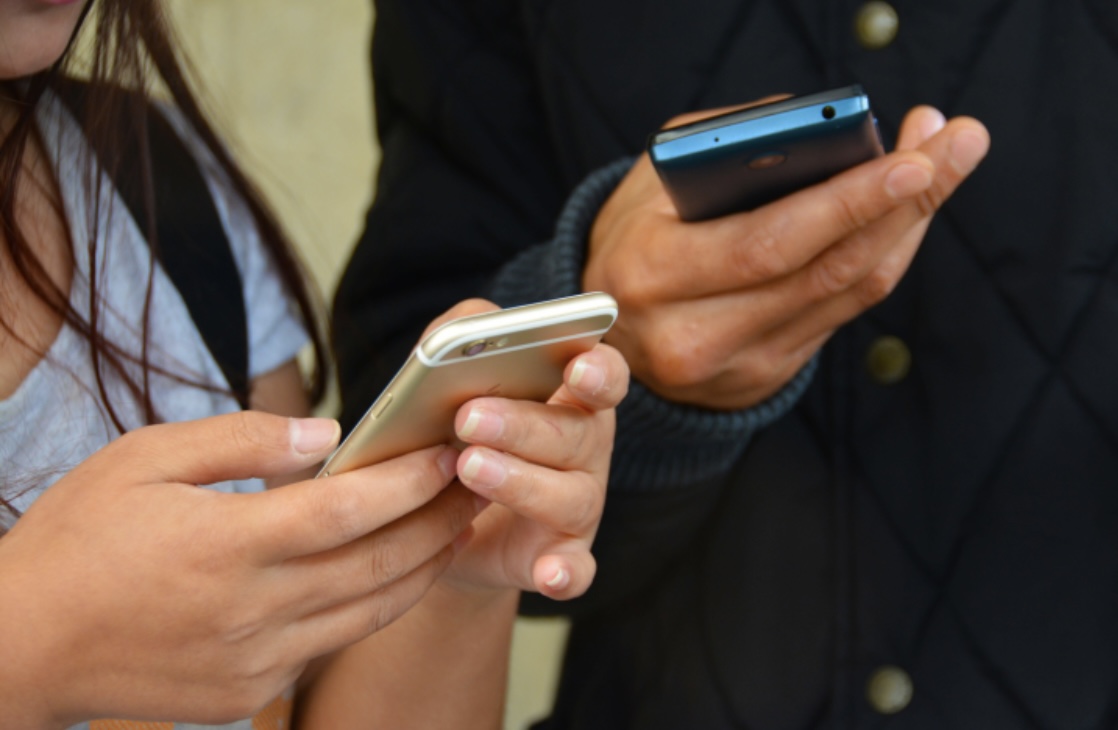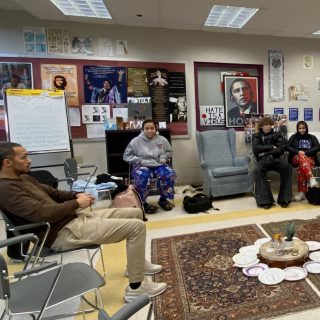New phone policy improves student focus, makes life easier for teachers

This fall, ARHS unfurled a new phone policy aimed at separating students from their phones during classes and keeping them off their phones as much as possible during the school day as a whole.
According to the policy, as stated in the ARHS school handbook, “electronic devices must be turned off and put in [phone pocket holders in each classroom] before the beginning of class.” Additionally, the policy states that headsets and earbuds should be out of sight.
Teachers have the flexibility to allow students to use their phones for educational purposes, such as listening to an interview recording while writing an article for a journalism class or using a measurement tool on a phone for physics class. However, by and large, phones are much less visible this year in classes than they have been in previous years.
While some teachers require every single student to store their phone in a pocket holder, others ask students to store them, but don’t check for every single phone. The result is that some students still keep their phones in their bag or pocket, but are much less likely to use them during class.
Teachers unanimously agreed that the new policy, if not perfect, has made things significantly better. ELL teacher Stephani Lopez-Rodriguez was a fan. “I know some students miss having their phones, but it’s better for their learning that they’re put away during class,” said Lopez-Rodriguez.
Science teacher Evan Mahnken agreed. “In my short teaching career I’ve seen phone addiction get worse and worse; so something had to be done,” he said.
English teacher Matthew Despres noted that while “not every student puts a phone in the pocket, I am seeing essentially no phones during class. Wherever they are–pocket, bag, home–there has been a significant shift.”
One benefit to this, according to dance teacher Remy Fernandez-O’Brien, is that students are interacting socially more. “I do see people talking to each other more during breaks, and being more present during class,” they said. “It makes it just that small bit easier to take a small risk and be present with the people around you, rather than armoring up and going inward.”
I know some students miss having their phones, but it’s better for their learning that they’re put away during class.
STEFANI LOPEZ-RODRIGUEZ
Sophomore Mia Allees-Berge agreed that the new policy has helped students be more present. “I like that when we go on breaks in class, I have no choice but to connect with people,” she said. “Classes in general feel more communal and less detached now that people can’t just resort to their phone in any downtime.”
Many students, including junior Shahd Ahmed, mentioned that the policy has decreased the distraction of phones during school, and has helped them focus on schoolwork. “A lot of people I have talked to have said they have been more focused, stay in class longer, and get a lot of work done,” said Amhed.
Senior Despina Kevrekidis agreed. “I often check my cellphone as sort of a nervous tic to look at the time, my notifications, check email, etc. and it helps to not have that distraction,” they said.
Although many students have benefited from the new policy, some have complaints.
Seniors Neil Cunniffe and Harriet Barber-Just feel that students should be trusted to make their own decisions on whether or not to use phones.
“We aren’t little kids; we can make our own decisions. If students are on their phones in class then they won’t do well; that’s on them,” said Cunniffe.
“Kids should be mature enough to monitor their own phone usage,” agreed Barber-Just.
Several students also expressed that they would rather have their phones with them to communicate with parents, especially during any emergency.
“Events which require evacuation, such as fire drills, are not as efficient with everyone having to collect their phones from the pocket before exiting a classroom,” said Kevrekidis. While such cases aren’t addressed in the current policy, one student suggested that in an emergency the teacher should be responsible for taking the phones outside.
As part of the new policy, “Headsets and earbuds must be out of sight, not around your neck, dangling from your ears, or hanging from your pocket.”
Lopez-Rodriguez thinks students should be given more of a chance to use music. “I think it’s worth a try and if a student isn’t able to stay focused when given the chance, they can just put the phone away in the pocket holder,” she said. “I think a little flexibility can be good.”
Freshman Keira Cunniffe agreed that music has been a helpful tool for her. “I work better listening to my music, so in some of my classes when I’m given the opportunity to have solo work I struggle to stay on task the whole time without the music.”
Junior Amelia Lingo noted that “none of my teachers really let us [listen to music], which sucks because it used to really help me during long writing sessions in history.”
As phone use and addiction has become more and more relevant, special education English and reading teacher Emily Pritchard thinks we should be doing more than just this policy.
“I think we also need to be teaching some kind of consumer literacy around our phones, social media, and tech,” said Pritchard.
Despres agreed. “A policy like this should be the culmination of early education and routines/habits that give students opportunities to practice those boundaries over time,” he said.
Despite some opposition, the new phone policy has had an overall positive effect so far.
Latin teacher William Roundy has noticed that “Learning is improving, and socializing is improving. I would guess that stress is reduced for a majority of students as well.”














